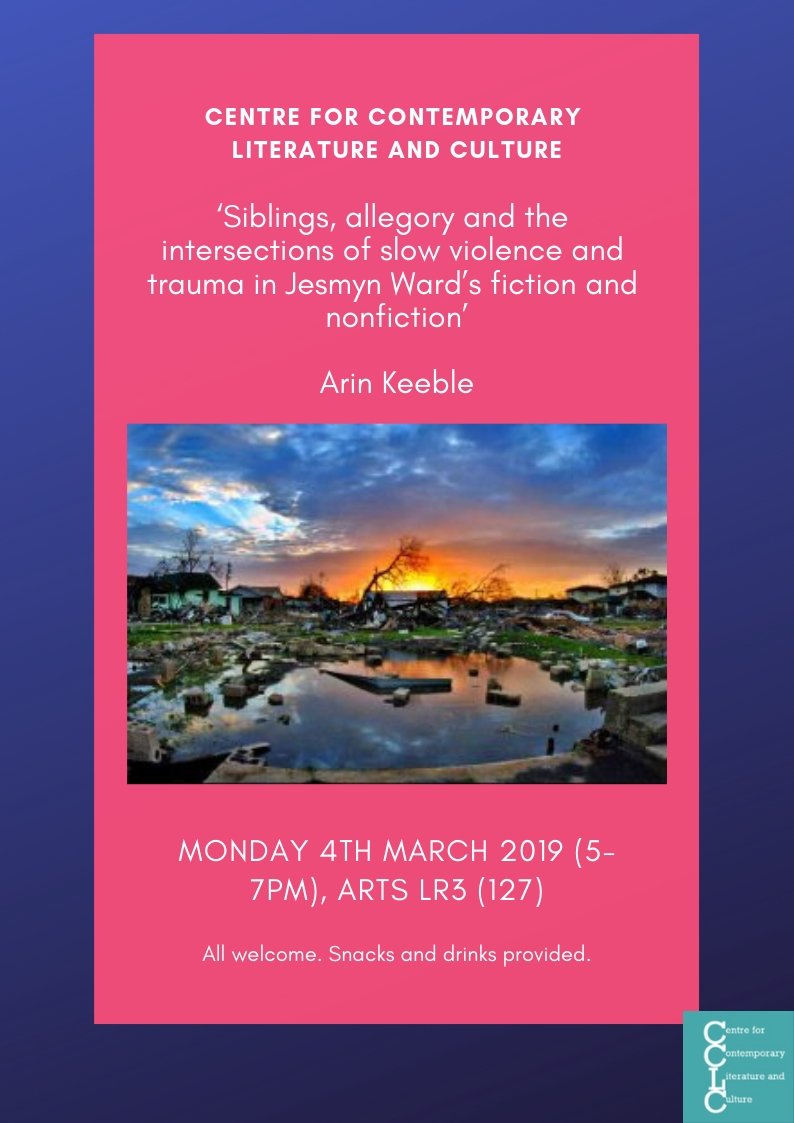
The evocative and urgent voice of Jesmyn Ward is a significant force in our contemporary movement towards amplifying the existence of black women in the United States. Through a wide reading of her literary works, Arin Keeble continued this project in a compelling and important talk on allegory and its applications, reading into the kinships of her texts to magnify how the literary might inform the ways we manage an ongoing crisis of racism and economic inequality in America.
Responding also to a meta-literary interest, the lecture engaged with wider philosophising about allegory and its properties. We might ask, he suggested to us, whether it inheres within the language itself as an intentional manoeuvre of the author, or if it is a strategy of interpretation that allows the reader to transform the text into a polyvalent tool for critiquing the world. How we approach allegory has a strong bearing on theoretical frameworks we bring to texts, and it shifts the ways we might want to apprehend Ward’s work and what it wants to show us. By recognising allegorical potential in Ward’s writing, Keeble deftly showed how her style of interpreting the world might help extricate our contemporary critical moment from an emerging impasse between the seemingly incompatible ideas of trauma on the one hand and slow violence on the other. This impasse has marked much recent theory on systemic oppression struggling to give it shape and visibility. Over the last eighty years or so of trauma’s critical dominance, we have slowly begun to come to terms with its inability to capture adequately the full machineries of structural oppression, or to propose universally successful schematics for what our political praxis could look like. In response to the political potentials of allegory that might lead us towards a capacitating understanding of violence in America, Keeble asked us to consider what Ward’s writing can tell us about the uniquely disenfranchised condition of life for many African American citizens of the US living in inner coastal Mississippi.
Even with shared allegorical components, Ward’s texts are diverse in genre and form, covering the coming-of-age narrative (Where the Line Bleeds, 2008), the domestic novel (Salvage the Bones, 2011), the memoir (Men We Reaped, 2013) and the road novel (Sing, Unburied, Sing, 2017). Throughout these forms, Keeble has identified recurring patterns of intense sibling relations within Ward’s many intertextual techniques. This work is at once conjuring of a harsh precarity of a domestic world fostered within poverty and discrimination, as well as Ward’s own deeply personal relationship with the crucial but fragile dynamics of sibling support. Keeble recognised how her work is often written in different ways to her brother Joshua, whose death at the hands of a drunk driver comprises the final part of her memoir, Men We Reaped. It is Ward’s ability to map onto her own personal tragedy a realism of economic inequalities and physical vulnerability that is the story of America for many of its black population, which displays the power of her writing for politics and criticism. Within the intense sibling kinship of her own biography is the knowledge of its potential for stable and comfortable world-building through sibling kinship in contrast with the harsher environments of the texts.
It is these sibling relationships, Keeble argued, that are rich in allegory and allow us a way into understanding both the conditions of institutional crisis and the different strategies for surviving it. From this kinship, Keeble convincingly inferred a citizenship that is dependent on mutual support of its members in the absence of government interest or intervention. The allegory, then, rests on an overlap of parental vs state relation and responsibility. In Ward’s novels, Keeble finds this overlap to be integrated into many patterns of poverty that affect Southern African American communities. The children of the texts, abandoned by their parents and compelled to rely on siblings for support, carry with them many nationwide post-9/11 anxieties about a state who has failed to protect its citizens. This crisis becomes layered onto Ward’s preoccupation with parents who struggle to care for their children, which also points towards systemic violence that underpins these complexities of parenthood. Keeble was rightly careful about reproducing the primacy of 9/11 to trauma narratives and to recognise the ongoing processes that have underpinned the US state’s relationship to its poorer citizens of colour long before 9/11 or any other similarly traumatic event, such as 2005’s Hurricane Katrina, took place.
Where the schematics of trauma is unable to offer input about the events it catalogues is in its inability to account for slower or less visible violence. Here, Keeble drew on the work of Lauren Berlant’s Cruel Optimism, in which she argues that trauma cannot explain the processes of adaptation to unfolding crisis that has become part of many people’s ordinary lives. The emphasis on shock alone fails to track any of the ingrained neoliberal policies that have been in place long before the rupturing event takes place and becomes exceptionalised. Keeble additionally cited Rob Nixon’s influential work on slow violence – which is both ‘incremental and accretive’ – that he sees being made visible by Ward’s accounts of PTSD. It is clear from the talk that her fiction is pivotal in giving form to the unexceptional aspects of oppression. Keeble’s argument strongly elaborated on exactly how her work negotiates that intersection between slow and traumatic violence through the allegorical rendering of kindship.
Question and Answer
Keeble completed his talk by considering many of the questions that arose from his reading of allegory. Amongst the most interesting included the possibility opened up by Ward’s work for representation away from event-orientated trauma theory, which ignores essential contextual elements such as race and geopolitics, and towards a tactical use of memoir to render invisible structural issues into accessible and utilisable language. This was carried into a recognition of Ward’s ability to map allegory onto realistic narrative, which Keeble argued allows it to connect real-life experiences of inequality to structural technologies of slow violence and oppression. We could see through this reading how slow violence might intersect with the unfinished business of trauma within Ward’s relation to the past. Keeble pointed out several of the ways in which she utilises memoir to write back to her brother, whilst also integrating a retrospective understanding of the inequalities that informed his death.
Reflections on the systematic oppression of African Americans in Ward’s work led into an interesting question regarding the specificities of literary tradition. It was asked whether there can be identified a trend unique to African-American writing in which trauma and slow violence explicitly overlap. Although no concrete generalisations can or should be made, Keeble proposed that there is certainly a unique standpoint inhabited by Ward’s characters from which we might better understand the emergence of slow violence – its patterns of poverty, racial discrimination, and familial instability – out of the trauma of chattel slavery and its immediate and destructive violence and geographical displacement. What is conclusive from Keeble’s lecture is the centrality of allegory to our ability to conceptualise the slippery and elusive content of slow violence, as well as the potentialities of our readings to extend this allegory into our own political interventions within what is currently an urgent crisis of racism and systematic violence in the United States and worldwide.
Arin Keeble is Lecturer in Contemporary Literature and Culture at Edinburgh Napier University. His new book, Narratives of Katrina in Context, will be published by Palgrave in July.

Twitter: @CCLC_bham
Website: https://bit.ly/2DWj1Qg
To join the CCLC maling list please email: r.sykes@bham.ac.uk
